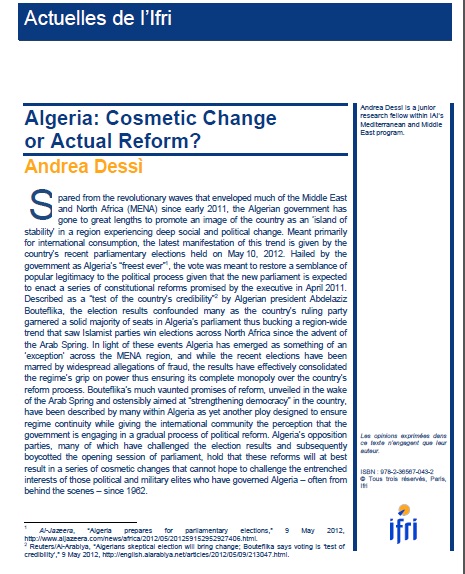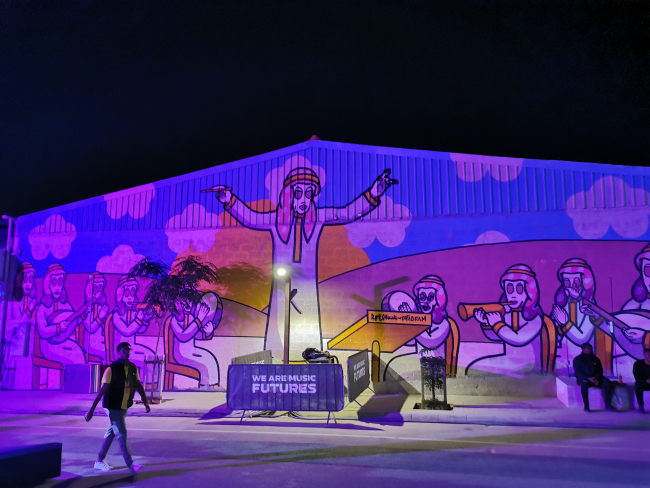Algeria: Cosmetic Change or Actual Reform?

Algeria has emerged as something of an “exception” across the Middle East and North Africa (MENA) region, and while the recent elections have been marred by widespread allegations of fraud, the results have effectively consolidated the regime’s grip on power thus ensuring its complete monopoly over the country’s reform process.
Spared from the revolutionary waves that enveloped much of the MENA region since early 2011, the Algerian government has gone to great lengths to promote an image of the country as an ‘island of stability’ in a region experiencing deep social and political change. Meant primarily for international consumption, the latest manifestation of this trend is given by the country’s recent parliamentary elections held on May 10, 2012. Hailed by the government as Algeria’s “freest ever”, the vote was meant to restore a semblance of popular legitimacy to the political process given that the new parliament is expected to enact a series of constitutional reforms promised by the executive in April 2011. Described as a “test of the country’s credibility”2 by Algerian president Abdelaziz Bouteflika, the election results confounded many as the country’s ruling party garnered a solid majority of seats in Algeria’s parliament thus bucking a region-wide trend that saw Islamist parties win elections across North Africa since the advent of the Arab Spring. In light of these events Algeria has emerged as something of an ‘exception’ across the MENA region, and while the recent elections have been marred by widespread allegations of fraud, the results have effectively consolidated the regime’s grip on power thus ensuring its complete monopoly over the country’s reform process. Bouteflika’s much vaunted promises of reform, unveiled in the wake of the Arab Spring and ostensibly aimed at “strengthening democracy” in the country, have been described by many within Algeria as yet another ploy designed to ensure regime continuity while giving the international community the perception that the government is engaging in a gradual process of political reform. Algeria’s opposition parties, many of which have challenged the election results and subsequently boycotted the opening session of parliament, hold that these reforms will at best result in a series of cosmetic changes that cannot hope to challenge the entrenched interests of those political and military elites who have governed Algeria – often from behind the scenes – since 1962.
Over a year since the outbreak of the Arab Spring, the government’s promises of political reform have yet to be implemented by Algeria’s ruling elites. While stability has thus far prevailed, Algeria’s profound imbalances in the social, political and economic realms seriously call into question the future sustainability of the Algerian regime. By analyzing the Algerian government’s promises of reform and the country’s recent parliamentary elections, the following research address the thesis of a so-called ‘Algerian exception’ and casts doubt over the regime’s genuine intentions for reform.

Available in:
Regions and themes
ISBN / ISSN
Share
Download the full analysis
This page contains only a summary of our work. If you would like to have access to all the information from our research on the subject, you can download the full version in PDF format.
Algeria: Cosmetic Change or Actual Reform?
Related centers and programs
Discover our other research centers and programsFind out more
Discover all our analyses
RAMSES 2025. Between Powers and Powerlessness
Never before have there been so many powers able to upset the international balance of power, and never before have the dominant powers seemed so powerless to counter the fragmentation of the world.
Out of Thin Air but More than a Mirage: The Politics of Saudi Arabia's Nascent Music Industry
This study critically examines Saudi Arabia’s nascent music industry, which is promoted as a key element of Vision 2030, Crown Prince Mohammed bin Salman’s strategic framework to diversify the kingdom’s economy. It explores how state-led investments in music and entertainment intersect with authoritarian governance. The author neither dismisses these investments as conspicuous spending nor reproduces an alarmist narrative of impending cultural imperialism. The article takes a political sociology approach to understand how Saudi entertainment plans consolidate domestic power and reshape regional cultural landscapes.
Hostage diplomacy of the Islamic Republic of Iran. The case of Europeans detained in Iran
The so-called hostage diplomacy of the Islamic Republic of Iran refers to a political and diplomatic strategy in which Tehran uses the detention of Western nationals, dual citizens, or Iranian citizens residing in Europe, Australia, or the United States as leverage in diplomatic negotiations. This practice aims to exert pressure to secure political, economic, or diplomatic concessions as part of Tehran’s asymmetric response strategy. Hostage diplomacy remains a controversial yet effective tool from the perspective of the Islamic Republic of Iran, given its context of economic sanctions and diplomatic isolation.
Is the Republican People’s Party (CHP) Rising from the Ashes?
The victory of the CHP [Cumhuriyet Halk Partisi, Republican People’s Party] in the Turkish municipal elections of March 2024 firmly established it as the leading party of opposition to the Islamic-conservative AKP [Adalet ve Kalkınma Partisi, Justice and Development Party], which has been in power since 2002.







